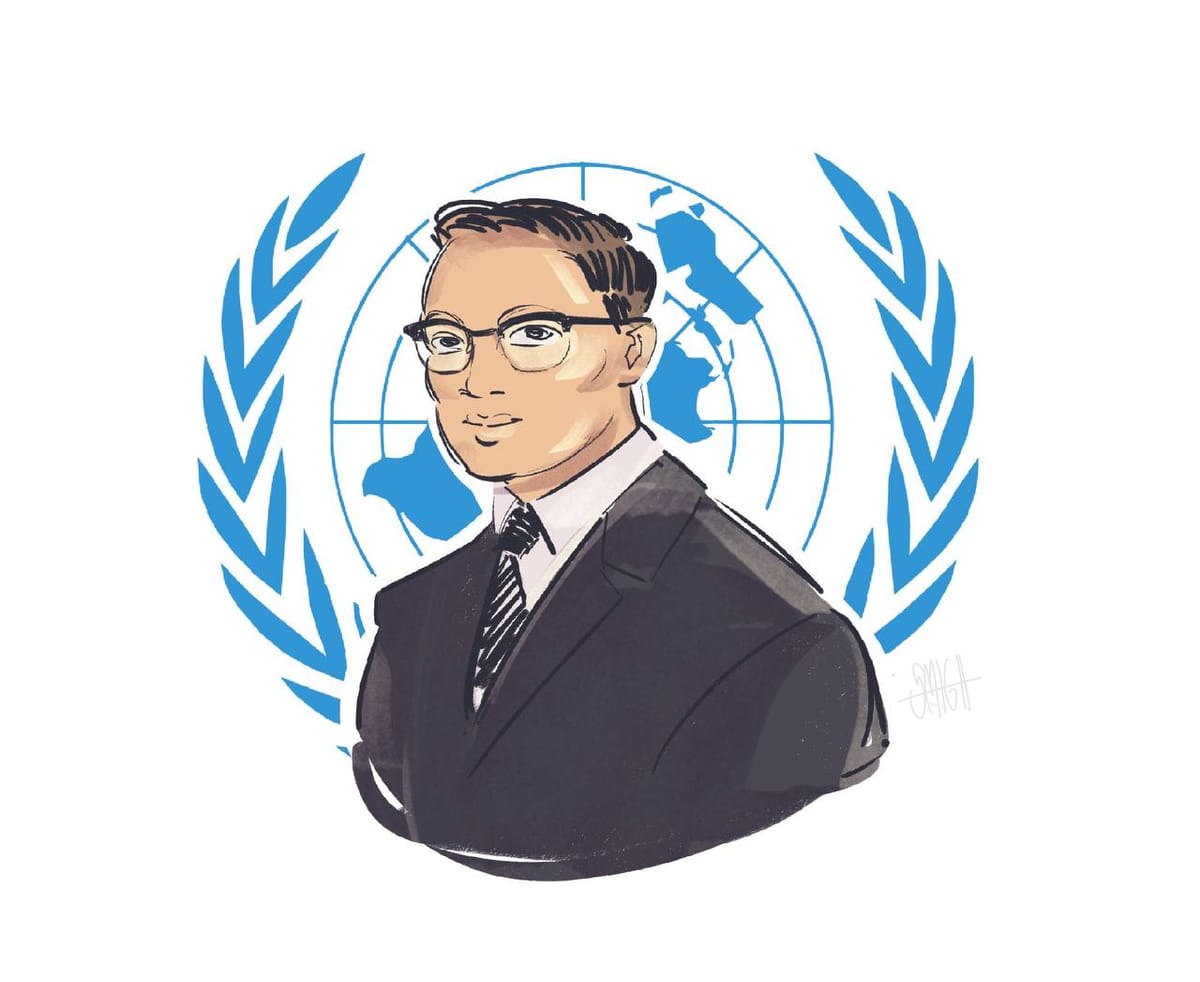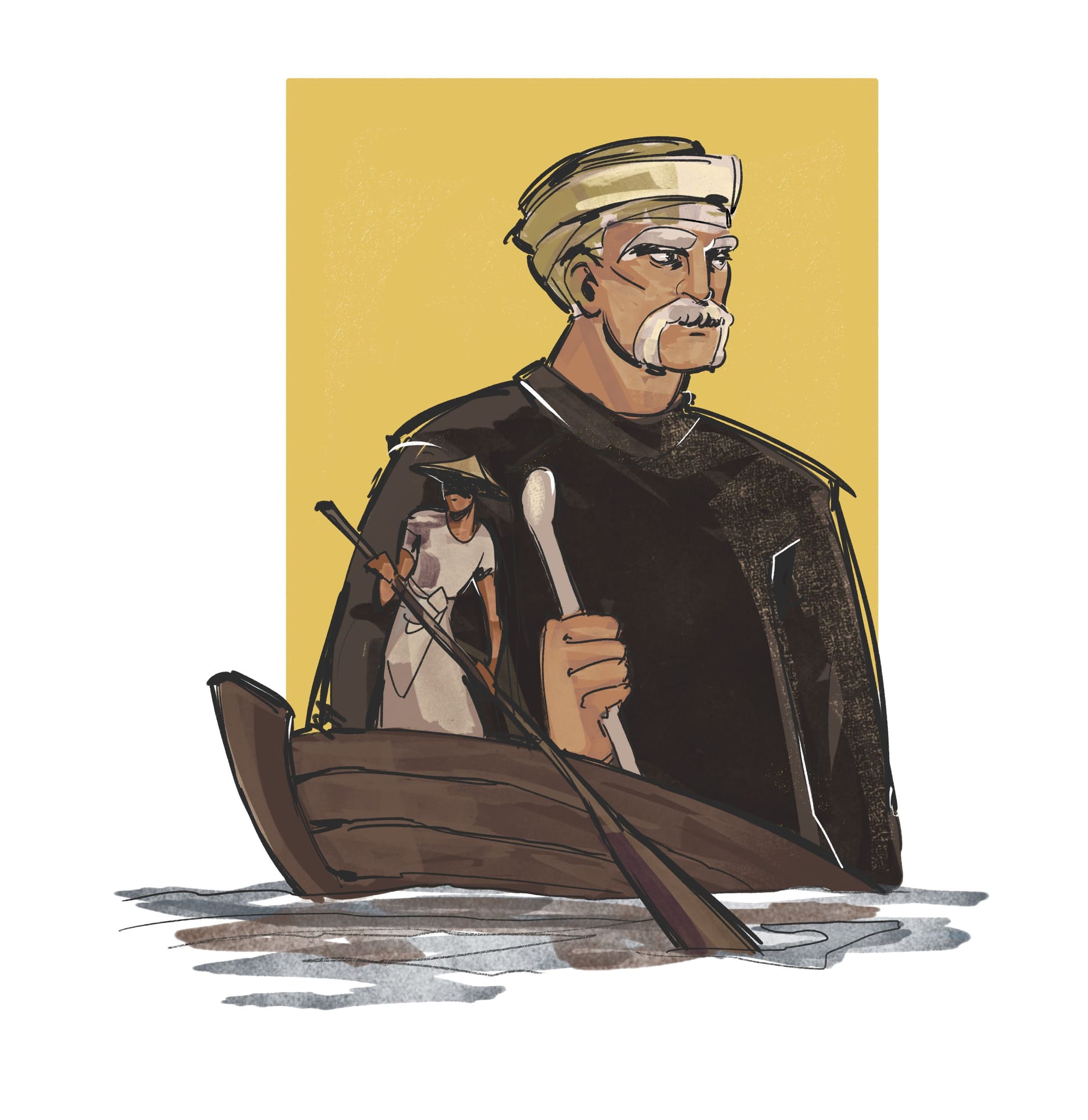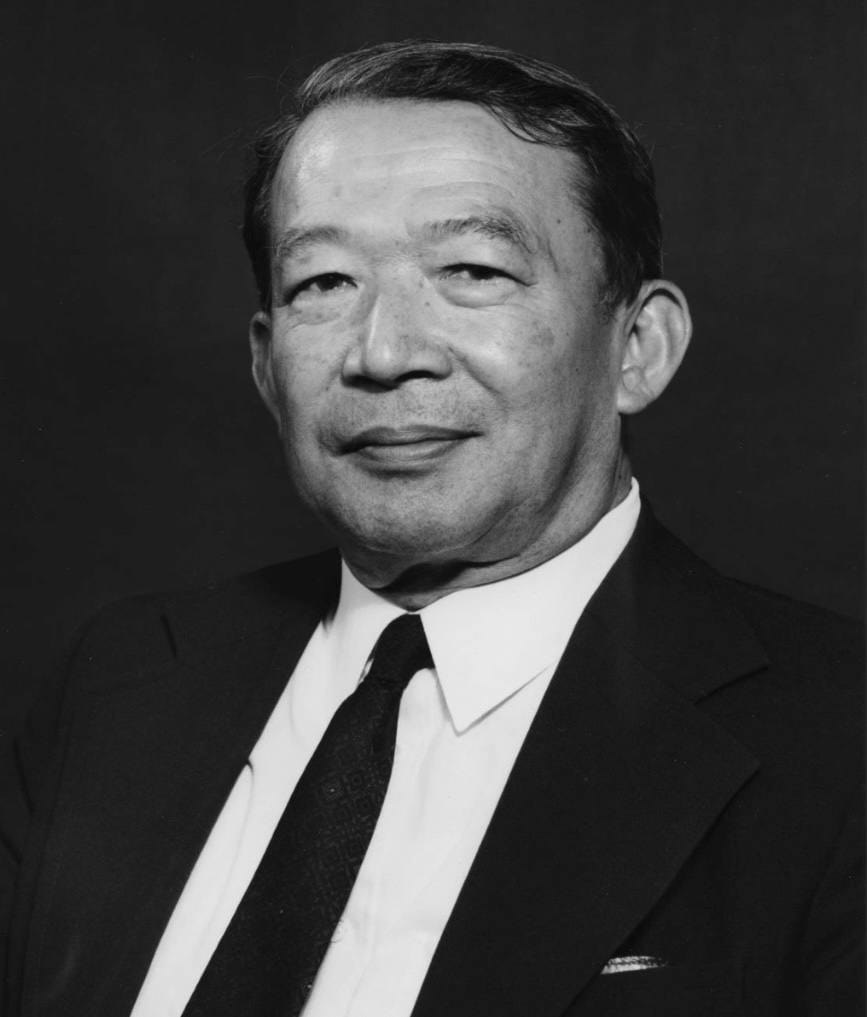
In the corridors of Rangoon University, a young man in simple canvas shoes and a pinni shirt was pursuing his second year of studies when his younger brother also gained admission to the university. Concerned about their family's financial situation, he made the selfless decision to leave his studies, exemplifying the responsibility of an elder brother.
He returned to his hometown and became a schoolteacher, later becoming a headmaster at a national school. Through his capabilities, he rose to become the Press Secretary, then the Executive Officer to the Prime Minister, and eventually the Permanent Representative to the United Nations. His journey didn't end there – he went on to become the Secretary-General of the United Nations, leading and handling world affairs.
In the 80 years of the UN's existence, only nine people have held this prestigious position. One of them was a citizen of Myanmar.
From Maung Thant to U Thant
In 1909, in Pantanaw, Ayeyarwady Division, a child was born to U Bo Nyi and Daw Nan Thaung, who were landowners.
Until 1911, when the child was two years old, he remained unnamed. 1911 marked the emergence of the famous Thuriya newspaper in Myanmar. Simultaneously, in the Myingyan region, a rebel leader named Minglaung Maung Thant appeared. At a time when the Burmese were anticipating rebellion against the British, the news of Minglaung Maung Thant's resistance against the British became what we'd now call "viral news." This news appeared in the Thuriya newspaper, which U Bo Nyi read.
Inspired by Minglaung Maung Thant, U Bo Nyi named his yet-unnamed son, born on a Friday, "Maung Thant." This name would later belong to the third Secretary-General of the United Nations.
School Teacher Days
In his youth, Thant attended YMBA Middle School in Pantanaw, the first school in the town to teach English. His father, U Bo Nyi, himself a graduate of Hunter College in Calcutta, India, made the forward-thinking decision to enroll him there. From an early age, Thant wrote telegrams in English and helped translate English telegrams for neighbors.
Young Thant was not only devoted to literature but also had a great passion for painting. By the age of 12, he was already deeply engrossed in reading Sir Arthur Conan Doyle's Sherlock Holmes and Shakespeare's plays.
In 1922, Thant passed his middle school examinations. He then attended Pantanaw National High School. During this time, his father U Bo Nyi passed away. In 1926, after completing his high school education at the national school, he entered Rangoon University. He stayed in various dormitories - Tagaung, Bagan, and May Aung Halls. There, he met friends who would later become prominent figures: Ko Myo Min (later becoming a Professor of English), Ko Nu (who would become Myanmar's first Prime Minister), and Ko Htin Aung (future Rector of Rangoon University).
However, Thant left university after his second year when his younger brother Maung Khant entered university. With their father gone, he worried about their family's financial situation. Thus, U Thant never earned a university degree. He returned to Pantanaw and became a teacher at the National High School. This is how Maung Thant became Teacher U Thant. At that time, U Thant's friend U Nu was the headmaster in Pantanaw. While teaching, he continuously wrote articles and poems until 1930. Later, when U Nu married and didn't return to Pantanaw, U Thant took over his position as headmaster. Thus, U Thant became the headmaster of Pantanaw National High School at just 22 years of age.
Moving to the City
In 1935, at age 26, U Thant married Ma Thein Tin, who had moved to Pantanaw from Sagaing, Taungtwin with her mother, running a cheroot-making business. They later adopted a child, and subsequently had two more children.
In 1942, Japan occupied all of Myanmar, though they later withdrew. In July 1947, U Thant's entire family moved to Rangoon. He had come to publish an English newspaper. In Rangoon, he met his friend U Nu, who by then was a leader of the AFPFL (Anti-Fascist People's Freedom League). U Nu offered U Thant a position in the AFPFL government, but U Thant was reluctant to join.
Government Service
On July 19, 1947, Bogyoke Aung San and his colleagues were assassinated. U Nu then became Prime Minister and formed a government. U Thant became the Press Officer in U Nu's government. He had to write and distribute the new government's actions and policies in both English and Burmese. Five months after independence, U Thant became the Director of Broadcasting. Later, he became Deputy Secretary of the Ministry of Information. At that time, U Aung Than (Bogyoke Aung San's elder brother) was the Secretary. When U Aung Than transferred to another department, U Thant became the Secretary.
As Information Secretary, U Thant wrote U Nu's political and economic speeches. Prime Minister U Nu and Information Secretary U Thant, friends since their university days, were both distinguished individuals with their own talents. They would take morning walks together, discussing national affairs.
In 1954, Prime Minister U Nu promoted U Thant to Executive Secretary to the Prime Minister. In 1955, he was appointed Secretary of the Ministry of Economic and Social Affairs.
Diplomatic Affairs
As U Nu's Executive Secretary, U Thant traveled to many countries and met world leaders. He had the opportunity to meet Soviet leaders Khrushchev, Leonid Brezhnev, and Alexei Kosygin; Chinese leaders Mao Zedong and Zhou Enlai; North Vietnamese leader Uncle Ho (Ho Chi Minh); Indian leader Nehru; Yugoslavia's Marshal Tito; and American leader Richard Nixon. He learned about international affairs from the inside while accompanying U Nu.
At this time, U Nu was at the height of his power domestically and his non-aligned foreign policy was prominent internationally. In 1952, U Thant led the Myanmar delegation to the United Nations General Assembly. As he became increasingly prominent in international relations, Prime Minister U Nu appointed him as Permanent Representative to the United Nations in 1957.
Becoming UN Secretary-General
The United Nations today might be considered a paper tiger, but in 1960, it was as powerful as a Bengal tiger. The UN Secretary-General was like a magician who could bring this tiger to life and direct it as needed.
In September 1961, UN Secretary-General Dag Hammarskjöld died in a plane crash. This was during a time when America and the Soviet Union were in a state of mutual hostility, threatening nuclear warfare in their struggle for dominance. When Hammarskjöld died, the UN and diplomatic community considered who should fill his position. It was particularly important to find someone acceptable to both the US and Soviet Union. That person was U Thant. His capabilities, diplomatic skills, integrity, and outspokenness had made him prominent on the international stage.
During the competition for the Secretary-General position, a French diplomat commented that U Thant was too short. U Thant wittily responded that Napoleon was short and couldn't speak English, yet he built the French Empire, adding that he himself was slightly taller than Napoleon and could write and speak English fluently.
Finally, U Thant received support from the majority of the UN community, including the Soviet Union and the United States, to serve the remaining one year of Dag Hammarskjöld's term as UN Secretary-General. His term was until November 1962.
However, U Thant served not just that one year. He continued as Secretary-General for another five years. When his term ended, he was asked to continue, but he declined. Later, when American and Soviet leaders personally met with him and urged him to stay, along with the desire of the UN and world leaders, he accepted the historical burden placed on his shoulders and served another 5 years. In total, U Thant served as UN Secretary-General for over 11 years.
The World in His Debt
"U Thant has put the whole world in his debt."
These were the words of U.S. President John F. Kennedy in 1963, expressing his deep appreciation for U Thant after the Cuban Missile Crisis, when the world was on the brink of nuclear war.
The Cuban Missile Crisis involved Cuba and the Soviet Union and their allies on one side, and the United States and its allies on the other, nearly resulting in a major war. Soviet President Khrushchev and U.S. President John F. Kennedy came head-to-head over this issue. This crisis occurred when U Thant had been Secretary-General for only about a year, but he handled the situation between the two leaders masterfully.
U Thant dealt with many critical situations: the 1963 Congo Crisis that required UN peacekeeping forces, the 1964 Cyprus Civil War, the 1965 Kashmir Crisis between India and Pakistan, and the famous 1967 Six-Day War between Israel and Arab states. U Thant handled all these major crises. He also clearly stated the UN's position on peace talks between leaders during the U.S.-Vietnam War.
Who Was U Thant?
In reality, U Thant never earned a university degree. Although he completed two years at Rangoon University and passed his intermediate exam, he never graduated, nor did he study abroad as a foreign scholar. However, U Thant was awarded honorary degrees by more than 30 foreign universities and colleges.
U Thant's distinguishing characteristics included his strong dedication to studying English from an early age, his love of reading, and his continuous writing. As he matured, he benefited from good friends like Prime Minister U Nu, demonstrated his true capabilities, earned the trust of his superiors, and maintained his integrity.
U Thant was loyal to Prime Minister U Nu, and U Nu greatly relied on him. Despite his loyalty, when he disagreed with U Nu, he would systematically and carefully present his criticisms.
Thanks to U Nu's non-aligned foreign policy, U Thant gained the trust of both the Soviet Union and the United States, and through his own capabilities, he was able to resolve difficult global crises.
In his time, U Thant was highly respected in the international arena. This article can only touch upon U Thant's magnificent achievements. U Thant led the United Nations during a time when America and the Soviet Union were on the brink of war, during the rivalry between communism and democracy. While both sides were trying to determine whether he was "their man," U Thant maintained his unwavering position and worked for world peace.
A young man from Pantanaw, Ayeyarwady Division, once wrote world history. He is remembered by both contemporary and later scholars as someone who faithfully carried out the historical responsibilities placed upon his shoulders by his era. That man was U Thant. He remains the only UN Secretary-General without a formal degree, and he left behind a legacy that future generations can look up to.
By Han Thit Ein (Y3A)
Read More:
 Build Myanmar - MediaY3A
Build Myanmar - MediaY3A
 Build Myanmar - MediaBuild Myanmar Staff
Build Myanmar - MediaBuild Myanmar Staff
Build Myanmar-Media : Insights | Empowering Myanmar Youth, Culture, and Innovation
Build Myanmar-Media Insights brings you in-depth articles that cover the intersection of Myanmar’s rich culture, youth empowerment, and the latest developments in technology and business.
Sign up for Build Myanmar - Media
Myanmar's leading Media Brand focusing on rebuilding Myanmar. We cover emerging tech, youth development and market insights.
No spam. Unsubscribe anytime.
Sign up now to get the latest insights directly to your mailbox from the Myanmar's No.1 Tech and Business media source.
📅 New content every week, featuring stories that connect Myanmar’s heritage with its future.
📰 Explore more:
- Website: https://www.buildmyanmarmedia.com/
- Facebook: https://www.facebook.com/buildmyanmar
- YouTube: https://youtube.com/@buildmyanmarmedia
- Telegram: https://t.me/+6_0G6CLwrwMwZTIx
- Inquiry: info@buildmyanmar.org
#BuildMyanmarNews #DailyNewsMyanmar #MyanmarUpdates #MyanmarNews #BuildMyanmarMedia #MyanmarNews #GlobalNews #TechNewsMyanmar #BusinessNewsMyanmar #Updates #Insights #Media
